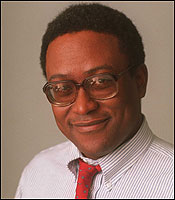New Evidence Of Talk Radio's Troubles
Poor Decisions, Lack Of Focus Affecting Quality
Is talk radio becoming derailed by peculiar programming moves, unfocused hosts and some who just don't belong on the air?
Recently, the Radio Equalizer has begun to receive feedback from industry managers, air talent and listeners, alerting me to disturbing developments in the medium.
At a time when blogs, XM, SIRIUS and podcasting threaten AM radio from every angle, one would expect a sharp focus on what works, an effective plan of attack.
Instead, the decisions become more baffling every day, with no sign of change coming soon.
Talk radio is adrift.
It isn't just about progamming moves, hiring and firing, but day-to-day program content as well. Here are some examples from just the past couple of weeks:
--- A longtime Dallas-Fort Worth talk show host, who built his reputation on conservative issues and once had a national program, spent an entire segment playing board games on-air with other staffers.
--- A conservative Milwaukee talk station has a morning talk host opening, but instead of taking the time to look for an experienced, well-read, entertaining, talk host to fill the slot, they're holding an "American Idol"-style talent contest.
It couldn't look cheesier on WISN-AM's part, either, wonder if staffers are red-faced over this ill-advised promotion.
--- A new liberal talker in Akron, Ohio, pretended to be a pirate station at first, imploring listeners not to trust corporate radio giants. But it turned out to be a trick, it was really a Clear Channel outlet gearing up to run a slate of (corporate-backed) "progressive" talkers.
It backfired to the point where even the New York Times chastised the company over the situation.
--- Some major national syndicated talk hosts recently spent so much time talking about congressional issues, important as they might have been, that they lost sight of what's made conservative talk radio popular: its entertainment value. One reader told me that he's in the habit of changing the station at the first mention of "Bolton" or "filibuster" on any talk show.
So which is it, Radio Equalizer, entertainment or content? It's about common sense, some hosts and programmers once had a grasp of this, but are now adrift. Some bad decisions were made when sales or music people took over talk station management, forcing out experienced talk radio programmers.
Combining a focused, well-prepped effort to lay out hot issues in a passionate, entertaining manner, with the occasional lighter topic, will still win audience loyalty.
When a talk host is playing board games on the air, that's a sign of serious trouble: he's either too complacent and comfortable in his position, bored, or starting to crack.
When a station thinks holding a contest will produce a host who can deliver ratings against the competition, when a key element of talk radio success is on-air experience, then something is very wrong.
In the Akron case, mistakes are piling on top of each other. The new Clear Channel talker features non-Air America liberals, because another AM outlet in town already locked them up.
So the city now has two stations, duking it out over a format not succeeding, virtually anywhere in the country.
And the stunt attracted negative attention from the New York Times:
To the average listener, Radio Free Ohio has all the earmarks of pirate radio. For weeks, it sounded as if amateurs had been bleeding their voices into the broadcasts of stations in Akron, Ohio, owned by Clear Channel, the corporate radio giant. At the Web site www.radiofreeohio.com, there was a manifesto about "corporate-controlled music playlists" that took potshots at several local Clear Channel stations. But there was no information about who had posted the screed, or what exactly Radio Free Ohio was.
But last week it came out that Radio Free Ohio was not a prank on Clear Channel but in fact a prank by Clear Channel. Tomorrow, an AM station the company owns in Akron will switch formats from sports talk to progressive talk, and Clear Channel would very much like anyone suspicious of corporate media to tune in.
"Once we determined we were going to change the format, we tried to get into the mindset of people who would listen to this new station," said Dan Lankford, vice president and market manager for Clear Channel in Akron. That mindset may involve a suspicion of Clear Channel itself, which has used loosened rules on media ownership to build a radio empire.
That Clear Channel owned the www.radiofreeohioorg Web site was revealed on www.stayfreemagazine.org, a magazine and blog about advertising and popular culture.
Stay Free's editor, Carrie McLaren, said that she had learned the information from someone who had seen it on an Akron Web site. "In a way it's the heart of the problem with Clear Channel," Ms. McLaren said of the manifesto. " 'We're this huge corporation and we do everything to fake being local.' "
Some might say that any publicity is good for a radio station, but this criticism is coming from the very audience segment they're trying to attract: younger liberals.
Listeners still have the same demands, but when talk radio is no longer delivering them, they're finding other places to go. Most distressing is that instead of recognizing the problem, radio keeps repeating the mistakes, with no end in sight.
















